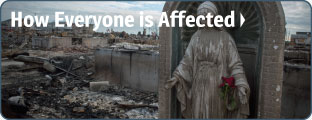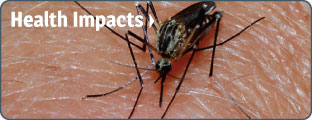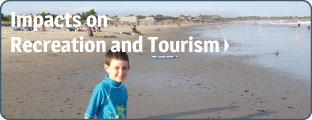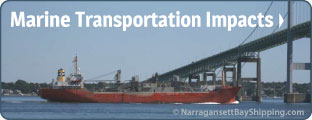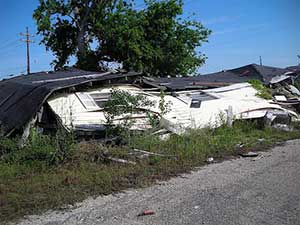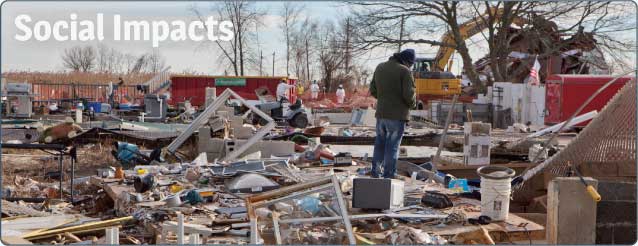
Photo Credit: FEMA
by Arthur Mead, Jr.
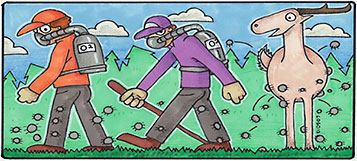
Tick...Tick...Tick - Over time, many more ticks and other annoying
insects, and reduced amounts of clean air will make outdoor
recreation a good deal less fun.
Climate Change Is Not a Fair Fight
Like many battles, the one of taking on climate change isn’t really a fair fight.
The various impacts that society will face as a result of global warming and changed conditions will strike hardest at the poorest, weakest and those with the fewest options. But no one is really off the hook.
The heat waves and massive storms in the U.S. during the last few years didn’t destroy Malibu or Wall Street. They hit America’s heartland and small communities of farmers,
![]()
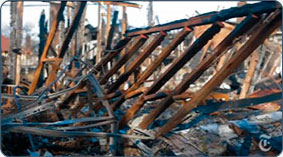 Devastation in Long Beach, NY after Superstorm Sandy
grocers and barbers with the striped pole out front — all those Norman Rockwell-ready residents. Rhode Island’s Great Flood of 2010 didn’t knock out universities
and the state’s wealthiest towns. The disaster primarily struck the state’s biggest (but not most high-end) shopping mall and commercial strip, its middle class bedroom communities, and rural South County, home of the state’s revered “Swamp Yankees.” But Superstorm Sandy has shown us just how Manhattan — what some would call the greatest city in the world — can be laid waste by one storm, and how the wealthy to the poor from Long Island to Staten Island can be devastated as beloved and iconic communities are flattened by winds and storm surge.
Devastation in Long Beach, NY after Superstorm Sandy
grocers and barbers with the striped pole out front — all those Norman Rockwell-ready residents. Rhode Island’s Great Flood of 2010 didn’t knock out universities
and the state’s wealthiest towns. The disaster primarily struck the state’s biggest (but not most high-end) shopping mall and commercial strip, its middle class bedroom communities, and rural South County, home of the state’s revered “Swamp Yankees.” But Superstorm Sandy has shown us just how Manhattan — what some would call the greatest city in the world — can be laid waste by one storm, and how the wealthy to the poor from Long Island to Staten Island can be devastated as beloved and iconic communities are flattened by winds and storm surge.
We stand warned by serious and credible scientists across the world that time is short and the dangers are great. The most relevant question now is whether our own government is equal to the challenge…In the years ahead, we are likely to see reduced water supplies…more forest fires than in previous decades…changes in crop production…more heat waves affecting our cities and greater intensity in storms. Each one of these consequences of climate change will require policies to protect our citizens, especially those most vulnerable to violent weather.”
– U.S. Senator John McCain (R-AZ)
News
“Tourists Are Flocking to Locations Threatened by Climate Change. That Only Makes Things Worse.” Vox
Factoids
Climate change threatens human health and well being in many ways, including impacts from increased extreme weather events, wildfires, decreased air quality, threats to mental health, and illnesses transmitted by food, water, and disease carriers such as mosquitoes and ticks. Some of these health impacts are already underway in the United States.
Public health actions, especially preparedness and prevention, can do much to protect people from some of the impacts of climate change. Early action provides the largest health benefits. As threats increase, our ability to adapt to future changes may be limited.
Critical infrastructure including roads, bridges, wastewater treatment facilities, and power stations will become more vulnerable to damage due to sea level rise, higher storm surges, heavy downpours leading to inland flooding, and extreme heat events.
Climate change will affect certain social groups more than others, particularly groups living in highly vulnerable areas, the poor, young, old, and sick. The impacts of climate change on different socio-economic communities must be taken into consideration during the adaptation planning process.
A warmer climate is projected to increase the risks of heat-related illnesses and deaths and lead to worsening air quality. The increasing frequency and strength of extreme events, such as floods, droughts, and storms, threaten human health and safety.
